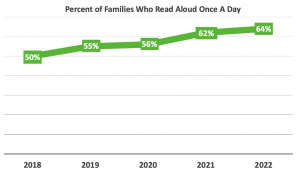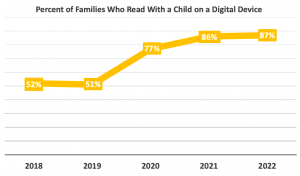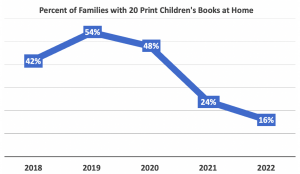 Parents and educators alike need timely information about how reading today may be different than it was in the past. In 2022, the pandemic, economic stress, and extreme weather events have all put stress on families with children and how they fit reading practices into their daily lives. To address this need, BookSpring conducts an annual Reading Survey of parents and caregivers to collect data about the reading attitudes and behaviors of families with children 12 and under. We share with the entire community so we can work together to better build young readers. This year’s survey results have been compared with the past five years to look for trends and influences.
Parents and educators alike need timely information about how reading today may be different than it was in the past. In 2022, the pandemic, economic stress, and extreme weather events have all put stress on families with children and how they fit reading practices into their daily lives. To address this need, BookSpring conducts an annual Reading Survey of parents and caregivers to collect data about the reading attitudes and behaviors of families with children 12 and under. We share with the entire community so we can work together to better build young readers. This year’s survey results have been compared with the past five years to look for trends and influences.
Print Books at Home Continue to Drop
The presence of at least 20 books at home when growing up creates an environment where children are more likely to succeed in school. After an increase from 2018 to 2019, there has been a steep decline in the number of books in the home for all families responding. A likely driver of this is disruptions from COVID as well as economic struggles. BookSpring sees this as unacceptable, as research still indicates that children learn better from print books, particularly in their early years. Even with over half a million books distributed since the beginning of COVID, we are not moving the needle enough across our wider community. As a result of this finding, and with the help of generous donors like you, we will work even harder to get more books to more children as soon as possible. However, the news is not all discouraging.
Frequency of Reading Aloud to Children Grows
 Interestingly, more families are reporting that they read aloud with their children at least once a day. A steady rise in the percentage of families who report they read aloud once or twice a day is an encouraging statistic. This could mean that families are getting their books from libraries, or that they define reading or books in different ways, or that they are repeating the same set of books over and over. In questions about the motivation and culture of reading, parents are reporting less difficulty in reading aloud, and fewer agree that their children find books boring. Could it be that reading activity at home is on the rise, even when print book ownership is falling?
Interestingly, more families are reporting that they read aloud with their children at least once a day. A steady rise in the percentage of families who report they read aloud once or twice a day is an encouraging statistic. This could mean that families are getting their books from libraries, or that they define reading or books in different ways, or that they are repeating the same set of books over and over. In questions about the motivation and culture of reading, parents are reporting less difficulty in reading aloud, and fewer agree that their children find books boring. Could it be that reading activity at home is on the rise, even when print book ownership is falling?
Reading Together on Digital Devices Jumps
 One potential factor driving reading together is the increasing presence of digital devices in all homes. While there are known inequities in access to both devices and broadband access both geographically and economically, most families in our survey are reporting having access to and using digital devices to read aloud with their children, with a big increase in the fall survey of 2020. This year, 87% of families reported reading with a child using a digital device. Luckily, BookSpring together with Unite for Literacy and Pratham Storyweaver offers hundreds of diverse, engaging open access children’s books online, with no password or credit card required.
One potential factor driving reading together is the increasing presence of digital devices in all homes. While there are known inequities in access to both devices and broadband access both geographically and economically, most families in our survey are reporting having access to and using digital devices to read aloud with their children, with a big increase in the fall survey of 2020. This year, 87% of families reported reading with a child using a digital device. Luckily, BookSpring together with Unite for Literacy and Pratham Storyweaver offers hundreds of diverse, engaging open access children’s books online, with no password or credit card required.
In conclusion, while the number of print books in homes with children has dropped dramatically, parents and caregivers are still interested in reading with their children. Clearly, the pandemic has changed the literacy landscape for children and families. It is encouraging however that parents and caregivers surveyed still feel that reading is important for their children’s happiness and success, as well as their own.
2022 Central Texas Reading Survey Results English (pdf)
2022 Central Texas Reading Survey Results Spanish (pdf)
Methods and Credits
This study was conducted in September 2022 with a panel of anonymous respondents screened for language, location, and the presence of children 12 and under in the home using Mechanical Turk. There were 203 respondents to the English survey and 118 in Spanish. These results should not be widely generalized as responses were only collected online. However, this method and questions have been consistent from year to year, in order to be analyzed for change over time as a population measure of progress or decline in the status of reading in families with children in Central Texas. This report was compiled by Dr. Emily Ball Cicchini, Executive Director of BookSpring.


